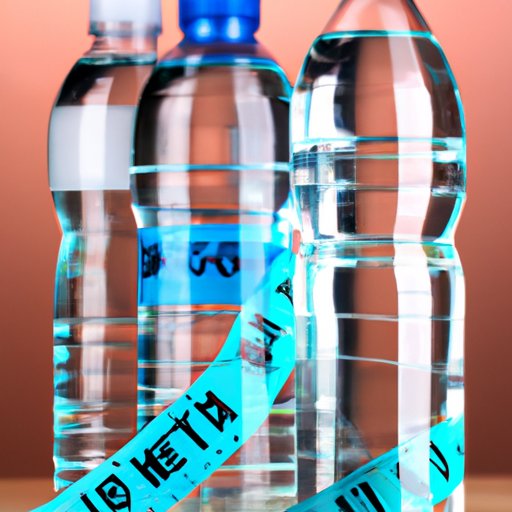
Introduction
Water weight refers to the accumulation of excess fluids in your body’s tissues. While it’s normal to retain some water, especially during your menstrual cycle or in hot weather, excessive water weight can cause your body to look and feel swollen and puffy. Common symptoms of water weight gain include bloating, swollen feet and ankles, and weight fluctuations.
If you’re looking to lose weight, shedding water weight should be your first step. Unlike fat, water weight can be lost relatively quickly with the right strategies. In this article, we’ll share tips and tricks to help you lose water weight safely and effectively.
Importance of Proper Hydration
It may seem counterintuitive, but proper hydration can actually help you shed water weight. When you’re dehydrated, your body holds onto as much fluid as possible, leading to uncomfortable bloating and swelling.
The recommended daily water intake varies depending on your activity level, age, weight, and gender. As a general rule, aim to drink at least eight glasses of water per day. If you’re exercising or sweating a lot, you may need to drink even more.
If you struggle to drink enough water, try incorporating more water-rich foods into your diet, such as fruits and vegetables. You can also add flavor to your water by infusing it with cucumber, lemon, or mint.
Cutting Down Sodium Intake
One of the main culprits of water retention is sodium, which causes your body to hold onto extra fluids.
Most people consume far too much sodium, often without realizing it. Processed foods, such as canned soups and frozen dinners, are often loaded with sodium. Even seemingly healthy foods like sauces, condiments, and salad dressings can be high in sodium.
To cut down on your sodium intake, start by reading food labels and avoiding foods that are high in sodium. Opt for fresh, whole foods whenever possible, and use herbs, spices, and vinegar for flavor instead of salt.
Increasing Potassium Intake
While sodium can cause water retention, potassium can help regulate your body’s fluid balance and reduce bloating.
Foods that are high in potassium include bananas, sweet potatoes, spinach, avocados, and almonds. Aim to eat a variety of potassium-rich foods as part of a balanced diet.
If you struggle to get enough potassium from your diet, you may want to consider taking a potassium supplement. However, it’s important to talk to your healthcare provider before taking any supplements, as they can interact with certain medications.
Natural Diuretics
Diuretics are substances that help your body get rid of excess fluids by increasing urine output.
While prescription diuretics can be effective in reducing water weight, they can also cause side effects and should be used under medical supervision. Natural diuretics, on the other hand, can be found in everyday foods and drinks.
Some natural diuretics include coffee, tea, green leafy vegetables, and certain fruits like watermelon and cranberries. However, it’s important to remember that natural diuretics can also cause dehydration if taken in excess. Always consult with your healthcare provider before using any natural diuretics as a supplement.
Regular Exercise
Regular exercise is essential for weight loss and overall health, but it can also be useful for shedding water weight. When you exercise, you sweat, which helps your body get rid of excess fluids. Additionally, exercise can improve your body’s circulation, helping to reduce swelling and inflammation.
If you’re new to exercise, start by incorporating small amounts of physical activity into your daily routine. You can begin with light walking, cycling, or swimming and gradually increase the intensity and duration of your workouts over time.
Lifestyle Tips
Some lifestyle factors can contribute to water retention. For example, stress can cause your body to release cortisol, which can lead to fluid retention and weight gain.
To reduce stress, try incorporating relaxation techniques into your daily routine, such as yoga, meditation, or deep breathing exercises. Getting adequate sleep is also crucial for reducing stress and promoting overall health.
Additionally, alcohol can contribute to water retention by dehydrating your body. Cut down on your alcohol intake or eliminate it altogether to help reduce water weight and improve your overall health.
Conclusion
Losing water weight can be an effective first step in your weight loss journey. By focusing on proper hydration, reducing sodium intake, increasing potassium intake, using natural diuretics, exercising regularly, and making small lifestyle changes, you can shed excess water weight and feel lighter, healthier, and more energized.
Remember, losing weight is a journey, not a destination. Don’t get discouraged if you hit a plateau or experience setbacks along the way. With dedication, perseverance, and the right strategies, you can achieve your weight loss goals and live your best life.




